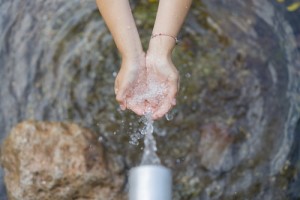
Three out of every four Americans get their tap water from a community water system. So when it comes to protecting our clean water supply, we’re all in this together.
Part of preventing water contamination is reducing the level of pollution flowing out of your home back into the environment. With an estimated five trillion liters of industrial & household sewage dumped annually in the United States, every little bit helps. Here are nine simple tips to help you make a difference.
-
Start a fat jar
Following fat, grease and cooking oil down the drain with hot water isn’t good enough. Instead of pouring these pipe-killing substances down the drain and back into our lakes and rivers, empty grease from pans into a fat jar to be tossed in the trash once the fat solidifies.
-
Don’t flush trash
The damage caused by flushing items that don’t belong in the toilet reaches far beyond blockages in your sewage system.
When trash reaches treatment plants it impedes the process of breaking down sewage and eventually makes it way to local beaches and river banks.
-
Follow instructions on detergent, bleach and soap bottles
Excessive use of cleaning agents when doing laundry or washing dishes is a waste of money and bad for the environment. If you like to double down on soap usage, consider purchasing eco-friendly brands.
-
Install a low-flush toilet and Watersense faucets & showerheads
The Watersense qualified toilets listed on Kolher’s Flush & Done website reduce your water usage by at least 20% with every flush!
Double down on water conservation by replacing outmoded fixtures with new energy efficient models. Most major manufacturers, such as Delta Faucet, list a number of products meeting or beating the EPA standards for inclusion in the program.
-
Leave hazardous materials to the pros
Dispose of harsh chemicals, paint and solvents directly through the sanitation department.
Many communities offer bi-annual removal programs where you can drop off these dangerous substances for free. Contact your City Hall or public works department for more information.
-
Practice responsible auto maintenance
Motor oil, antifreeze and other car related liquids can wreak havoc on local fish runs when washed down storm drains and into creeks and streams.
Fix leaky gaskets or other worn vehicle parts the moment you see splotches appear in your parking space.
-
Go au naturale in the garden
Minimize the application of herbicides and pesticides when maintaining your lawn and garden. Practice organic gardening techniques to the best of your ability and incorporate plants native to your area to allow for lush gardens without chemical fertilizers.
Constructing a small compost box for yard waste and kitchen scraps will reduce household waste while building a renewable supply of nutrient-rich soil for your plants.
-
Keep dog waste out of storm drains
Clean up after your dog and dilute feces with a garden hose to wash waste down into the roots of your lawn before heavy rains can carry this toxic material into nearby storm drains.
-
Replace corroded piping
Your household plumbing system won’t necessarily last the life of your home. When pipes rust they release contamination into the environment and are more likely to leak over time.
Replacing corroded pipes sooner rather than later is both environmentally responsible and smart preventative maintenance to prevent unwanted flooding from burst pipes.
